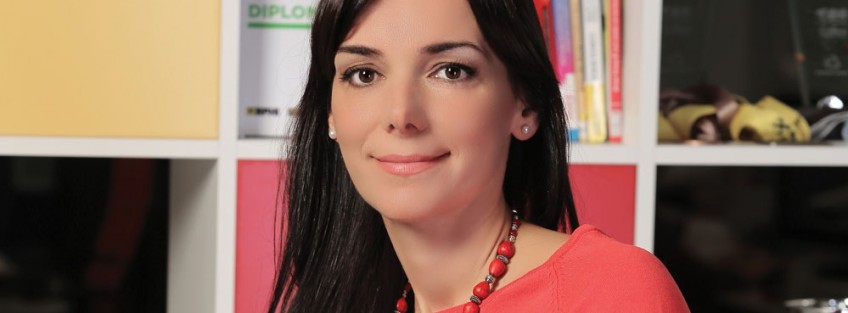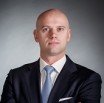An interview with Ilinca Paun
Thu | 01.09.2016
Other
1. Dear Ilinca, please introduce yourself shortly to all our members.
I am Managing Partner with Colliers International, born in Bucharest 42 years ago and an architect by profession. I am mother of 3 children, passionate about business management, education and mountain expeditions.
2. When did you find out about the NRCC and its activities?
As soon as it was created in Romania I was aware of its special nature. We assist many Dutch companies with their real estate strategies, so getting to know them better under NRCC membership came as a natural step.
3. What are your expectations for your mandate as a board member?
I learned that realistic expectations are only the ones that we put out for our ourselves, not others, so I firstly expect myself to get involve and help the organization to become its best, which means more quality members and more successful initiatives to improve our members business results.
4. Nowadays in Romania, more and more women control businesses, having a big say in their areas of expertise. Is it hard, maybe different that 5 years ago or easier when you deal with foreigners?
I think foreigners have a more evolved perception for women being involved in business at high levels. It is a given for more educated countries to engage their women in business, not yet so much for Romania, if you take the statistical data, and not solely focus on Bucharest private business. So I would say it is no different than 5 years ago, and I must admit it was always easier for me to do business with foreigners. The difference lies in how you see yourself and what image are you displaying.
5. The Generation Y Office concept, green buildings, technology & big data, parking for change: many trends and shifts are happening on the global real estate market. How is Romania responding to that?
We are responding with about 5-10 years’ delay, even 20y compared with US markets. In our favor, I would ad that we are fast learners and we know when something it is good, so we copy fast and sometimes make a better version than the original. There are several sources of change in Romania. The first one is what private foreign corporations are demanding from a building. The green certifications that today are a must, but only because blue chip companies agreed back home in their HQ that in order to create a future they need to support the concept of sustainability in everything they do. So Real Estate was on the list for this. And they sent to the local team the mandatory request for any office space they occupy to be green.
A more local source of technical upgrade of buildings is the need for optimization. Again a buzz word for post crisis period. Energy efficiency, floor efficiency, premises cost optimization has driven the developers to invest more in equipment’s that show you in real time how one company uses the space. A building is becoming soon a collection of measurement sensors that provide data so the consultants can further use to optimize the way the space and parking area is used and optimize direct cost. In this respect, I would say that Romania is still lagging behind. I estimate that another 5 years will pass until we will have a similar building like The Edge in Amsterdam, which is considered one of the most technologically advanced building in Europe.
And the third important source is the talented work force. The young generation is demanding a different look and feel of the office. Flex office, recreational spaces, creativity corners, office coffee shops, massage rooms, as well as a design that encourages transparency, collective leadership, intrapreneurial spirit, autonomy and responsibility. All these features are today in Romania in the tool box of the consultants. It took a while to convince the managers that a happy employee is a more productive employee, but we are finally getting through the old mentality and step into the new management era, where business is done out of a sense of purpose and love, not fear and discipline.
Except office space changes, we see Romania being ahead in logistics sector, with lots of modern facilities for factories and warehouses. A sector where we are still behind our European peers is the retail markets, since the penetration of on line retail is still small.
6. So far, was 2016 a good year for the local real estate market? What are the main issues your clients face now in Romania?
Yes, the year was very good so far. But Brexit and acts of terrorism around the world are affecting the investing appetite. So far, new buildings are being built, in Bucharest and the main secondary markets – Timisoara, Cluj-Napoca and Iasi. Rents are stable and one good news is that the residential markets are back and it is a good time to buy a new apartment, for personal or investment purposes.
7. Poland is in your opinion a role model for Romania in term of real estate development. What do you need for that?
To get to the size and value of the Poland market, firstly we need the economic and political stability of Poland. Fundamentally we are very different. Location of Poland is much better and its business connections with Germany are hard to steel away. Even if we were both under communism regimes, there were big differences between us, especially regarding relationships with Russia. Indirectly, these affects investors choice for real estate development.
8. In the end, please a message to our members.
Be thinking more long term than short term in these years. The future of Romania and its attractiveness depends on how we see ourselves long term. And invest in the young generation, get their knowledge up with intensive educational programs and invite them into your management boards to participate in decision. I think our companies are as good as our young employees, since they are the ones that will take it forward.
2025
-
November (1)
-
October (1)
-
September (1)
-
July (1)
-
June (1)
-
April (1)
-
February (2)
-
January (1)
2024
-
November (1)
-
October (1)
-
July (1)
-
May (1)
-
March (1)
-
February (1)
-
January (1)
2023
-
November (1)
-
September (2)
-
August (2)
-
June (1)
-
May (1)
-
April (2)
-
March (1)
-
February (2)
-
January (2)
2022
-
December (3)
-
November (4)
-
October (3)
-
September (4)
-
August (3)
-
July (6)
-
June (4)
-
May (4)
-
April (8)
- Marketing News by diARK - April 2022
- Finance News by Mazars Romania - April 2022
- Experience the Perfect Chauffeur Transfer with David Intercar
- Mobility News by Business Lease - April 2022
- NRCC MEMBER IN SPOTLIGHT, WOLTERS KLUWER
- Crowe Romania and DeclaratiaUnica.ro engage in the automation of the single return form and the offering of personalized consultancy
- Cryptocurrency News by Bitcoin Romania, April 2022
- Legal News by BBW LAW - April 2022
-
March (6)
-
February (4)
-
January (5)
2021
-
December (3)
-
November (4)
-
October (2)
-
September (2)
-
August (1)
-
July (5)
-
June (3)
-
May (5)
-
April (4)
-
March (7)
- Cryptocurrency News by Bitcoin Romania, April 2021
- HR News by CNA International Executive Search Romania, March
- Real Estate News by CTP Invest, March 2021
- Sale-Purchase of Agricultural Land Located Outside Build-Up Areas
- MEET THE NRCC BOARD CANDIDATES 2021
- Fleet Management – Complete Makeover or Small Adjustments?
- Cryptocurrency News by Bitcoin Romania, March 2021
-
February (5)
-
January (6)
2020
-
December (2)
-
October (2)
-
September (3)
-
August (2)
-
July (6)
- NRCC Member in Spotlight Interview - Autonom
- Insolvency Proceedings: New Rules
- Member in Spotlight, UniCredit Bank
- Financing opportunities overview for large enterprises, SMEs and other organizations
- Companies: Simplification of Formalities
- Call for Leaders | What is your readiness score to benefit from the EU SURE initiative?
-
June (5)
-
May (8)
- The State of Alert. New rules for the collective proceedings
- The Retail Industry
- EU grants up to 6 Mil Euro for SME-s investment projects
- Member in spotlight, Heisterkamp Transportation Solutions
- State of Alert...What Is New
- The forced transformation of the automotive industry – Mazars analysis
- State of Alert in Romania
- Reducing the Impact of the Pandemic
-
April (6)
-
March (2)
2019
-
November (2)
-
July (1)
-
June (1)
-
March (2)
-
January (1)
2018
-
October (2)
-
September (1)
-
August (1)
-
July (3)
-
June (2)
-
May (1)
-
April (1)
-
March (3)
-
February (13)
- NRCC Elections 2018 - Elena Badea
- NRCC Elections 2018 - Loreda Dragomir
- NRCC Elections 2018 - Simina Fodor
- NRCC Elections 2018 - Manuel Herraiz Orti
- NRCC Elections 2018 - Tom Leene
- NRCC Elections 2018 - Mircea Moga
- NRCC Elections 2018 - Ronald Oort
- NRCC Elections 2018 - Razvan Pascu
- NRCC Elections 2018 - Alexandru Popescu
- NRCC Elections 2018 - Mihaela Tudor
- NRCC Elections 2018 - Loredana Van de Waart
- NRCC Elections 2018 - Edwin Warmerdam
- NRCC Elections 2018 - Philip Aarsman
2017
-
November (1)
-
September (1)
-
August (2)
-
May (1)
-
April (2)
-
March (1)
2016
-
November (1)
-
September (8)
-
June (1)
-
February (2)








